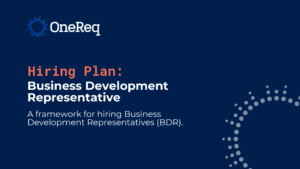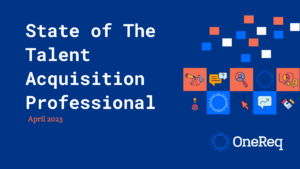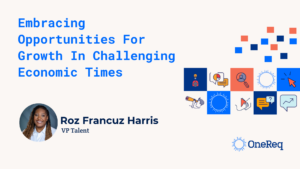BY: Jeremy Lyons
Jeremy Lyons is a RecOps Leader. You can connect with him on LinkedIn here.Recruiting Operations (also known as RecOps) can generally be broken down into four pillars. They are Data, Programs, Operations, and Strategy. Let’s dig a bit deeper into each and how they all work together to form your recurring operations function.
Data
What this is? Why is this important?
RecOps professionals often manage the recruiting team’s data if the People Analytics function is unable to provide a dedicated resource or doesn’t exist. This means RecOps pros are responsible for building dashboards, cleaning data, conducting candidate surveys, defining KPIs and success metrics, and interpreting the data. While data management can be challenging for some in TA/RecOps, it can also be one of the most highly rewarding skills to acquire.
What is the percentage of time a RecOps profession spends doing this?
Depending on the company, a RecOps professional can average up to 20% of their week on data-related topics, whether that is reporting, analysis, and creating actionable insights.
What Goes Into This Skill
- Partnering with your Financial, Planning, and Analysis (FP&A) team to understand budget and headcount planning
- Building out dashboards and look for trends or insights that you can bring back to your leadership team
- Learning Excel/Google Sheets formulas
- Learning a BI tool (e.g. Tableau, Looker, PowerBI)
- Learning a data language like SQL
Examples:
- Dashboard Building, Defining KPIs, Pulling Ad Hoc Reports
Programs
What this is? Why is this important?
Talent Acquisition teams often do more than recruit. Frequently they are asked to design long-term programs around specific topics (i.e., University Recruiting, Internal Mobility, Interview Skills, and more) that may run cyclically or as one-off events. RecOps professionals are often involved with these programs as a way to maintain the TA team’s strategies, ensure that communication and guidance are followed, and track progress. Some RecOps teams might also have program managers with specific specializations to ensure they run optimally.
What is the percentage of time a RecOps professional spends doing this?
Depending on the company, a RecOps professional can average up to 20% of their week on program-related topics, though if it is right before a program launch it could be significantly more. These include planning/reconciliation/vendor meetings, PowerPoints/Slides, and more.
What Goes Into This Skill
- Knowledge of program/project management and best practices
- Research/ Networking – In order to understand what other companies are doing
- Stakeholder management
- Knowledge of presentation software (i.e. PowerPoint, Google Slides, Notion, etc)
- Requirement gathering
Examples:
- University Recruiting, Internal Mobility, External Agency Management, Interview Skills Training
Operations
What this is? Why is this important?
RecOps primarily exists to make a Talent Acquisition team more efficient and continuously improving. This means attempting to innovate as close to zero as possible by scoping new tools, developing new processes, and working with numerous stakeholders to make ideas a reality. Changes at this level often have a broader impact on the entire Recruiting team and enable it to hit its goals.
What is the percentage of time a RecOps professional spends doing this?
Depending on the company, a RecOps professional can expect to spend upwards of 40% of their week on operational-related topics. These can include resolving tool issues, advising and working with the coordination team (or handling the coordination themselves), and general efficiency projects.
What Goes Into This Skill
- Learning problem-solving and lateral thinking
- Knowledge of Applicant Tracking Systems (i.e. Greenhouse, Workday, Ashby)
- Knowledge of HR Information Systems / Human Capital Management tools (i.e. Workday, UDP, ADP, BambooHR, etc)
- Knowledge of Recruitng tools (i.e. sourcing, data analytics, etc)
- Knowledge of interview scheduling best practices
- Knowledge of human-centered design thinking
- Knowledge of project management
- Knowledge of system design thinking
Examples:
- Recruiting Coordination, Recruiter Enablement, Systems
Strategy
What this is? Why is this important?
Effective operationalization of recruiting teams often starts with a strategic approach. While some may associate strategy with spy thrillers or meetings with senior leadership, there’s much more to it than that. RecOps strategy involves analyzing existing processes to identify inefficiencies, planning for future tools and processes, and anticipating potential challenges with well-prepared solutions. Quantifying the work done here is often tricky because measuring it can take months. By prioritizing strategic planning, RecOps professionals can significantly enhance their efficiency and impact on the recruiting teams.
What is the percentage of time a RecOps professional spends doing this?
Depending on the company, a RecOps professional can average up to 20% of their week on strategy-related topics. These include planning meetings, high-level initiatives, working on budgets, and defining and aligning team missions.
What Goes Into This Skill
- Partnering with TA Leadership to understand overall company goals, how they will impact TA, and how to translate them into actionable goals and steps
- Learning a project management methodology (e.g. Waterfall, Agile, Scrum) and effectively implementing them to help the TA team hit there goals
- Continuously scoping new tools that will make the TA team more efficient
- Knowledge of budgets
- Knowledge of software development lifecycles (this helps when dealing with SaaS products)
- Knowledge of implementations
- Understanding whether building, borrow, or renting a solution fits your framework
Examples:
- Alignments, Team Mission, Initiatives, Budget




